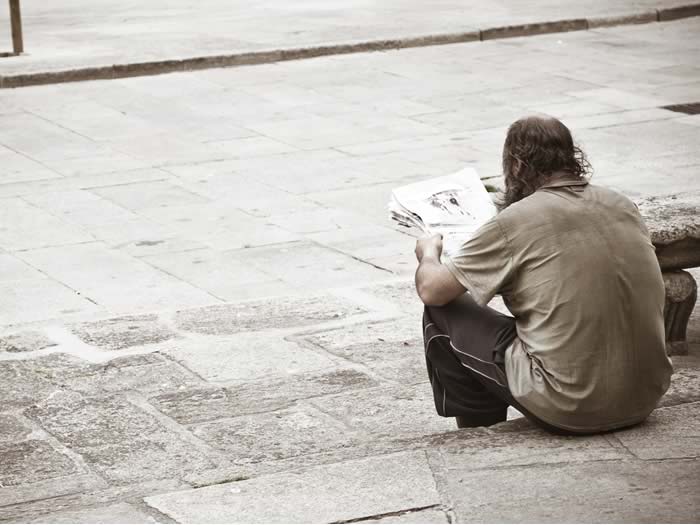October 13, 21st. Sermon for the Sunday after Pentecost
Psalm 66:1-12 2
Timothy 2:8-15
Luke 17:11-19
Despite the rhapsodic psalm with its praise for a God of deliverance and the firm advice given to Timothy, I suggest we think about the Luke reading this morning.
On his travels, his reputation going on before him, Jesus is approached by a group of lepers’. They ask for mercy and Jesus responds by healing them and they are told to go and present themselves as such to the priests. Only one comes back to say thank you.
First, the geography is interesting. Jesus is on the move, his ministry slowly leading him from the north to Jerusalem in the south. He was himself of course a northerner, suspected for his origins by the soft southerners where he ended his life. Galilee had been under separate administration from Judea for almost a thousand years. Economically it was strong, with better resources from the land and from the sea than mountainous Judea, but the people there spoke with a distinctive form of Aramaic – they dropped their aitches and Judeans found that funny, as well as suggesting their country cousins – ‘that lot up there’ were regarded, one commentator suggests, as semi-pagan.
(Does the north/south divide sound familiar?).
So Jesus presumably spoke with an accent that marked him out as different from the Judeans. For some people before anything he said or did, he would be an outsider. There’s that telling phrase in Luke’s account of the last days; the crowd say to Pilate – ‘he stirs up the people by teaching throughout all Judea, from Galilee ‘where he began, even to this place.’ ‘Where are you from’ is a question we often ask someone who isn’t local. ‘Are you a Bathonian’ people sometimes say to me, which is another way of saying ‘are you one of us’? Sophisticated Judeans would not have regarded Jesus as one of them.
There’s this reference to the region between Samaria and Galilee which is probably Perea, part of the kingdom of Herod the Great on the eastern side of the River Jordan.
Again, this is an area distinct from Judea.
Lepers were literally outcasts as they were in recent history until modern medicine discovered ways of easing or curing the illness. We still have lepers squints in older churches where such people could look through a hole at an act of worship they were forbidden to share in. At the time of Jesus they were made to keep themselves away from people and their illness was seen as some sort of punishment; the ‘untouchables’. So these ten lepers are breaking the rules by even approaching Jesus. Mark and Matthew tell another story of a leper being healed by Jesus who actually did touch the man. So if not actually himself breaking the law, certainly Jesus is defying it. Anyone else would have said, ‘go away’.
To be a human being and never able to have contact with other human is intolerable; the only group you belong to is the same underprivileged people as yourself; you belong to a sort of ghost society. And so people whom we may regard as undesirable have ever since been characterised as lepers, and there are many such people in our own society for whom we should have care. Economic and political constraints are marginalising more and more people in our community; people are taking sides on the issue of immigration, for example. Christians will always insist that people be seen as people.
Jesus has more than care for these ten (why ten I wonder ?), he has ‘mercy’, as he so oft en did for so many people who were sick. It was one of the names by which people may chiefly have remembered him. Perhaps he was primarily known as a ‘Healer’ and in honour of that, Christians have always been associated with ministries of healing. In our efforts to resist the total commercialisation of our National Health Service we are behaving as Christian citizens. It’s part of our mission, to respect and heal the sick, not to make money out of them. So it needs to be done well and without economic discrimination.
Show yourself to the priests. There are several ideas around as to why Jesus said this. The best one for me is that the healing contained a hidden message from Jesus – ‘beware I’m on my way to Jerusalem’. Tucked away in Galilee and Perea he could be watched and monitored by the religious and civic authorities, but at least he was outside the centre of power. But not for much longer
Of the ten, only one comes back and the shock statement is that he is a Samaritan. Hardly as different as lepers there was still an immense social barrier between Jews and Samaritans. They had their own version of the Law of Moses, their own priesthood, and their own temple. They were people of a mixed race; had mixed marriages and were therefore regarded by strict Jews as racially impure. It’s the Galilean thing again, but more so. The one person who comes back to say ‘thank you’ is another non-person as far as the tradition regarded him , but for Jesus, he is a person in need.
‘Your faith has made you well’. So what about what can only be called a miracle? We may have different ideas about the gospel writers belief that Jesus has an other-worldly power. If so it wasn’t used indiscriminately, but was a response to particular need and involves some sort of trust in Jesus, I n his compassion and his power. St John goes overboard on the number of he performed: John 21:25 states that «Jesus did many other things as well. If every one of them were written down …even the whole world would not have room for the books that would be written.» Again, whatever happened this is about healing, not tricks.
So where does this leave us and what does this passage tell us about Jesus? Rules and regulations have to be challenged if not to overthrown. The poor need to be valued, the sick healed and debtors forgiven. In all his dialogue with people who follow him in his day he challenged the accepted norms of society. The American scholar J.W.Funk puts it like this ‘Jesus was socially promiscuous – he ate and drank publicly with petty tax officers and sinners, yet he didn’t refuse dinner with the learned and the wealthy. He was seen in the company of women in public which was a scandal in his society and included children in his social circle when children were regarded as chattels, especially girls’.
So this is a characteristic moment in his life, this travelling preacher and prophet. He was out of favour with the political and priestly class which was why he was struck down, humiliated and killed. He was out of tune with the sophisticated southerners in Judea. He was not in tune with the customs which ruled behaviour, and at home with outsiders defined by where they came from, or by their physical condition.
What I see as uniquely true of Jesus – this man who noticed outsiders, healed and made friends of them, and which we so easily lose sight, makes me interested in the God he believed in and the society he dreamed of, and restores him to his proper place as the friend of sinners and of the lost and the losing, the scourge of the rich and the powerful, the lover of the poor and the healer of the sick.
When we think of outsiders we think of the people we don’t wish to socialise with and prefer to leave to the interest of charities set up to look after them. But Jesus noticed such people, favoured them, chose them, made friends with them. Was he just a social reformer? No, but its something to be that!
Unless that is the basis of our belief in him, the whole fabric of religion, our ways of worship, indeed our personal faith is without shape or form and has nothing to say to the wounded and wounding world we live in. Jesus had the temerity to speak for God. But he also spoke for the people shunned by others.
It’s my favourite hymn. ‘The Kingdom of God is justice and joy’ by Bryn Rees. The second verse –
The Kingdom of God is mercy and grace
The lepers are cleansed. The sinners find place
The outcasts are welcomed God’s banquet to share,
And hope is awakened in place of despair





